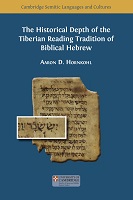The Historical Depth of the Tiberian Reading Tradition of Biblical Hebrew
Author(s)
Hornkohl, Aaron D.
Collection
ScholarLedLanguage
EnglishAbstract
This volume explores an underappreciated feature of the standard Tiberian Masoretic tradition of Biblical Hebrew, namely its composite nature. Focusing on cases of dissonance between the tradition’s written (consonantal) and reading (vocalic) components, the study shows that the Tiberian spelling and pronunciation traditions, though related, interdependent, and largely in harmony, at numerous points reflect distinct oral realisations of the biblical text. Where the extant vocalisation differs from the apparently pre-exilic pronunciation presupposed by the written tradition, the former often exhibits conspicuous affinity with post-exilic linguistic conventions as seen in representative Second Temple material, such as the core Late Biblical Hebrew books, the Dead Sea Scrolls, Ben Sira, rabbinic literature, the Samaritan Pentateuch, and contemporary Aramaic and Syriac material. On the one hand, such instances of written-reading disharmony clearly entail a degree of anachronism in the vocalisation of Classical Biblical Hebrew compositions. On the other, since many of the innovative and secondary features in the Tiberian vocalisation tradition are typical of sources from the Second Temple Period and, in some cases, are documented as minority alternatives in even earlier material, the Masoretic reading tradition is justifiably characterised as a linguistic artefact of profound historical depth.
Keywords
standard Tiberian Masoretic tradition;Hebrew Bible;written components (consonantal);reading components (vocalic);Tiberian spelling;Tiberian pronunciationDOI
10.11647/OBP.0310ISBN
9781800649804, 9781800649811, 9781800649828Publisher
Open Book PublishersPublisher website
https://www.openbookpublishers.com/Publication date and place
Cambridge, 2023Series
Cambridge Semitic Languages and Cultures, 17Classification
History of religion
New Testaments
Bible readings, selections and meditations
Historical and comparative linguistics


 Download
Download Web Shop
Web Shop